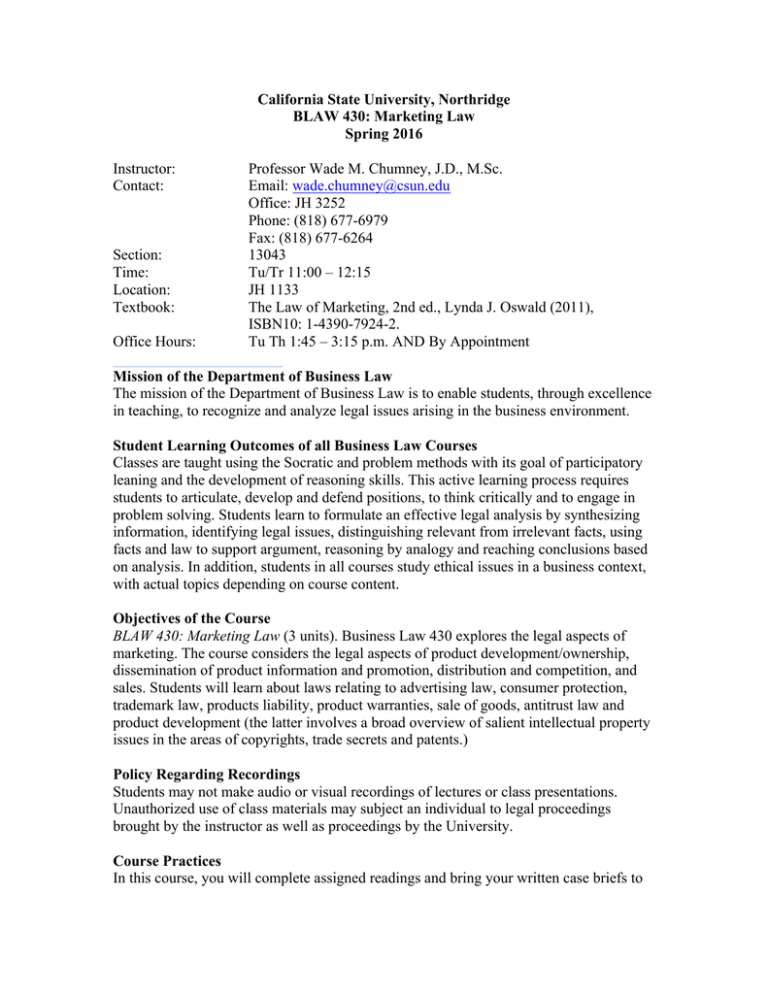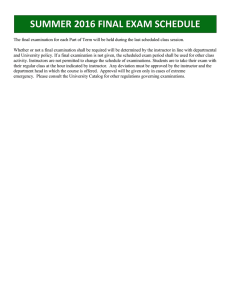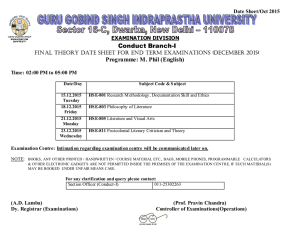BLAW 430 () - California State University, Northridge
advertisement

California State University, Northridge BLAW 430: Marketing Law Spring 2016 Instructor: Contact: Section: Time: Location: Textbook: Office Hours: Professor Wade M. Chumney, J.D., M.Sc. Email: wade.chumney@csun.edu Office: JH 3252 Phone: (818) 677-6979 Fax: (818) 677-6264 13043 Tu/Tr 11:00 – 12:15 JH 1133 The Law of Marketing, 2nd ed., Lynda J. Oswald (2011), ISBN10: 1-4390-7924-2. Tu Th 1:45 – 3:15 p.m. AND By Appointment Mission of the Department of Business Law The mission of the Department of Business Law is to enable students, through excellence in teaching, to recognize and analyze legal issues arising in the business environment. Student Learning Outcomes of all Business Law Courses Classes are taught using the Socratic and problem methods with its goal of participatory leaning and the development of reasoning skills. This active learning process requires students to articulate, develop and defend positions, to think critically and to engage in problem solving. Students learn to formulate an effective legal analysis by synthesizing information, identifying legal issues, distinguishing relevant from irrelevant facts, using facts and law to support argument, reasoning by analogy and reaching conclusions based on analysis. In addition, students in all courses study ethical issues in a business context, with actual topics depending on course content. Objectives of the Course BLAW 430: Marketing Law (3 units). Business Law 430 explores the legal aspects of marketing. The course considers the legal aspects of product development/ownership, dissemination of product information and promotion, distribution and competition, and sales. Students will learn about laws relating to advertising law, consumer protection, trademark law, products liability, product warranties, sale of goods, antitrust law and product development (the latter involves a broad overview of salient intellectual property issues in the areas of copyrights, trade secrets and patents.) Policy Regarding Recordings Students may not make audio or visual recordings of lectures or class presentations. Unauthorized use of class materials may subject an individual to legal proceedings brought by the instructor as well as proceedings by the University. Course Practices In this course, you will complete assigned readings and bring your written case briefs to class. We will engage in class discussions to facilitate your understanding of new material. You will share your case briefs, opinions, and analytical thinking. Your level of preparation will contribute to your and your classmates’ learning experience, and accordingly will influence your grade. Assignments Supplemental assignments and readings will be announced in class or through on-line communication and/or posting on Moodle. It is always your responsibility to obtain the assignments whether they are assigned solely in class or posted online. We will also review articles and cases outside of the text. Student Evaluation Your final grade will be calculated as described below: The grading system (as described in "Regulations" in the CSUN catalog) includes plus/minus grading and is as listed below. Grade Weighted Grade Points A 93-100 A- 90-92 B+ 87-89 B 83-86 B- 80-82 C+ 77-79 C 73-76 C- 70-72 D+ 67-69 D 63-66 D- 60-62 F 0-59 Policies and Procedures Professor reserves the right to ban electronic devices in the course. A warning will be given. Examinations will cover material imparted in class, class lectures and discussions and all assigned readings. Examinations will not be cumulative. Students will have the entire class period to complete examinations. No additional time will be granted, including for students who arrive late. Assignments Class Participation Percent of Final Grade 20% Midterm 40% Final Exam 40% Examinations will consist of essays and/or multiple choice questions and will be closed book. Use of any materials during examinations is prohibited. Students are not permitted to remove examination materials from the classroom during the examination or after its completion. Upon completion of the examination, students must turn in their answer sheets and examination questions. Examinations must be taken on the dates administered in order to receive credit toward the final grade. Students who must miss an examination due to personal illness or injury, death or illness in the family, jury duty or religious holidays must contact the instructor prior to the examination, or as soon as reasonably possible (but no later than one week after the examination), to make alternate arrangements. Student athletes are urged to contact the instructor as soon as possible to discuss their ability to sit for examinations on the days set forth in the syllabus. Students will not be permitted to sit for examinations after the scheduled dates set forth in the syllabus without the instructor’s prior approval. Such approval is within the sole discretion of the instructor. Any student failing to abide by these policies will receive a zero for the examination in question. Class Participation All benefit when students actively participate in classroom work and discussions. The participation grade reflects three things: 1) students’ performance in the classroom: providing insights and interpretations to issues raised and participation in class discussions, and 2) students’ attendance in the course. Student participation and attendance are key elements to the successful completion of this course. A significant portion of this course will be devoted to the discussion of issues and events relating to the course materials. Students must be prepared to discuss course materials at all times. In order to be fully prepared to participate, all assignments described in the syllabus must be read prior to the class in which they will be discussed. General Policies Students are expected to arrive on time for class. Once in class, students should remain until the class is completed. In order to facilitate discussion and assist the instructor with getting to know individual class members, students are requested to display name cards in class. There will be no exceptions to the policies set forth in this syllabus. Students are encouraged to contact the instructor if they are having difficulties with the course or require additional assistance. Academic Honesty We will adhere to the university’s policy on academic honesty. Instances of academic dishonesty will result in a grade of “F” for the course and will be referred to the Dean's office for further action. Course Topics I. II. III. IV. V. Overview of the Legal Environment of Marketing Activities Product Development a. Protection of Intellectual Property Assets through: i. Copyrights; ii. Trade Secrets; and iii. Patents Product Promotion 1. Trademark Law and Rights of Publicity; 2. Commercial Speech and the Regulation of Advertising; and 3. Consumer Protection Laws Pricing and Distribution Channels 1. Antitrust Law 2. Franchising Law Product Sales 1. Sale of Goods 2. Warranties and Products Liability Class Sessions Class sessions will typically include: An opportunity for questions regarding material from the previous class session Lecture Student presentation/discussion of case briefs and chapter problems Discussion Week Chapter/Topic Assignment 1 1: Overview of the Legal Environment of Marketing Law 2 2: Legal Issues Related to Product Development: Brief Cases 2.1, 2.3 Protection of Intellectual Property Assets: Patent and Discussion Questions 1, 6, 7 Copyright Law 3 3: Legal Issues Related to Product Development: Brief Cases 3.1, 3.2, Protection of Intellectual Property Assets through Trade Discussion Questions 1, 2 Secret Law, Contractual Agreements and Business Strategies 4 6: Legal Issues Related to Product Promotion: Trademark Brief Cases 6.1, 6.2 Law Discussion Questions 2, 3, 4 5 6: Legal Issues Related to Product Promotion: Trademark Brief Cases 6.3, 6.4 Law Discussion Questions 5, 7 6 7: Legal Issues Related to Product Promotion: Brief Cases 7.1, 7.2 Commercial Speech and the Regulation of Advertising Discussion Questions 1, 10 7 7: Legal Issues Related to Product Promotion: Brief Cases 7.3, 7.4 Commercial Speech and the Regulation of Advertising Discussion Questions 11, 12 8 Midterm 9 Spring Break 10 8: Legal Issues Related to Product Promotion: Consumer Brief Cases 8.1, 8.4 Protection Law Discussion Questions 1, 3, 5 11 4: Issues Relating to Product Development: Antitrust Brief Cases 4.1, 4.2 Law Discussion Questions 1, 2 12 4: Issues Relating to Product Development: Antitrust Brief Cases 4.3, 4.4 Law Discussion Questions 3, 5 13 5: Issues Relating to Product Development: The Brief Cases 5.1, 5.2 Franchisor-Franchisee Relationship Discussion Questions 2, 6 14 5: Issues Relating to Product Development: The Brief Cases 5.3, 5.4 Franchisor-Franchisee Relationship Discussion Questions 8, 10 15 9: Legal Issues Relating to Product Sale: Contracts and Brief Cases 9.3, 9.4 Sales of Goods Law Discussion Questions 6, 7, 8 16 10: Legal Issues Relating to Product Sale: Warranties Brief Case 10.1, 10.3, 10.4 and Product Liability Discussion Questions 4, 6 Final Exam Tuesday 5/17/16 at 10:15


